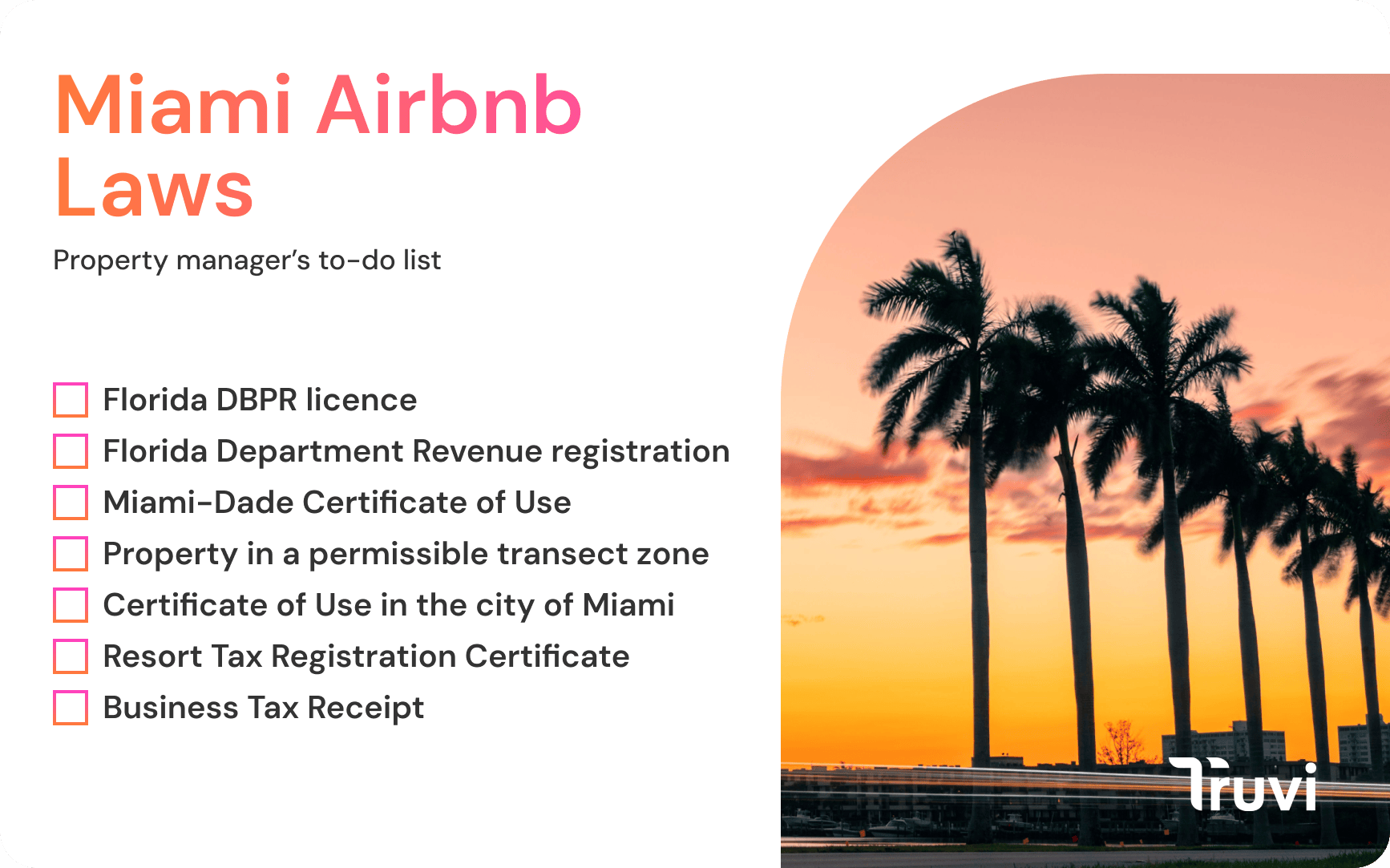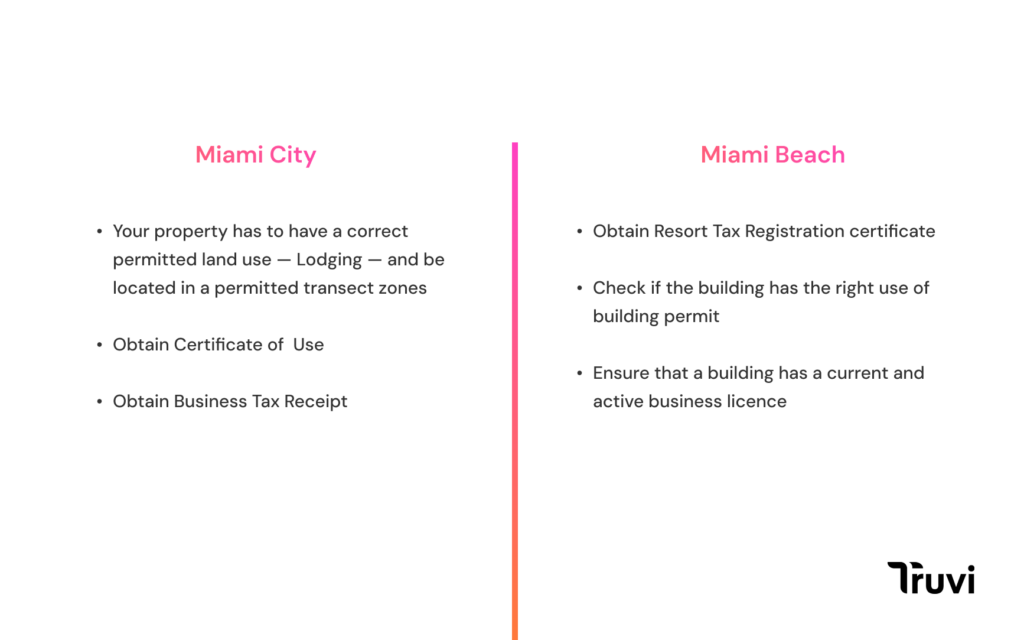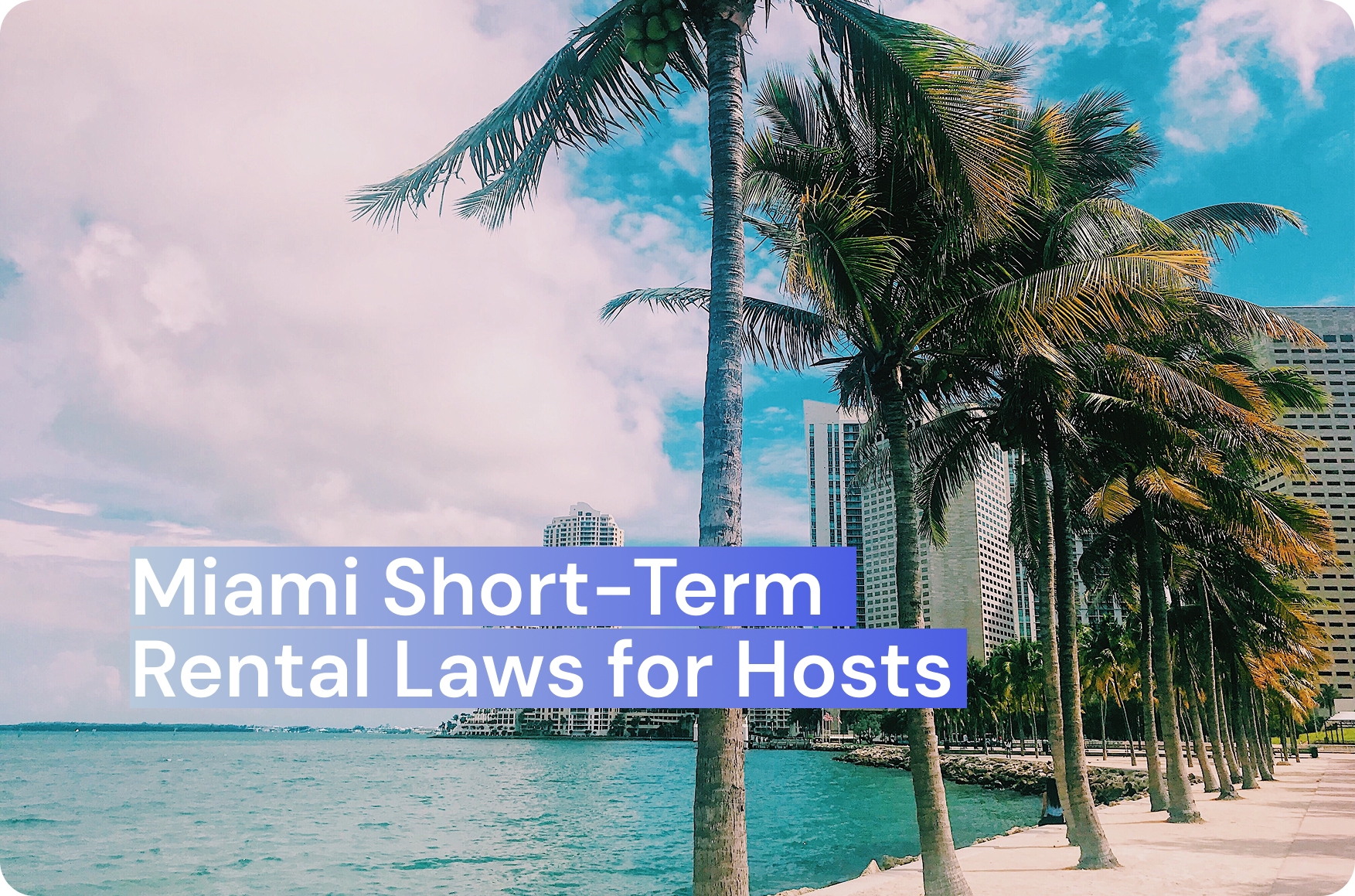Miami is one of the most visited US cities, with 4.4 million international tourists annually*. Domestic tourism also generates millions of visitors searching for affordable property for the weekend. It makes Miami a popular choice to start Airbnb and host guests short-term.
But before turning your property into an Airbnb dream listing, you must make sure the local regulations allow you to rent it short-term. Miami short-term rental laws are pretty strict, just like the STR laws in many other US cities. You must register your property with the city, obtain the right license, and consider zoning restrictions and other nuances.
Learn more about Miami and Miami Beach Airbnb laws in our overview. You will also find step-by-step instructions on how to start an STR business in Miami and stay compliant.
Does Miami allow Airbnb?
Is Airbnb legal in Miami? Yes. The city severely limited short-term rentals in residential areas in 2018, but you can still run an STR business. High occupancy and average daily rates are worth the hassle of following the strict Miami short-term rental laws. You just need to obtain all the necessary permissions and check the Miami Airbnb zoning map to invest in a property that can be used for short-term rentals.
Miami short-term rental ban and how it works now
The city government started to worry about unregulated short-term rentals in 2016 when the expansion of Airbnb and similar platforms went out of control. As short-term rentals rapidly grew, locals suffered from the shortage of available property and the influx of tourists, ruining their calm lives. These were the same reasons that made many cities introduce short-term regulations globally.
This resulted in new Miami short-term rental laws passed in 2018. They introduced the owner-occupied rule, property registration requirements, zoning restrictions, and penalties. Property owners faced stricter limitations and severe fines, with some cases leading to court. Despite property owners protesting against the limitations, the Miami Court reinstated the ban on vacation rentals. As a result, these Miami Airbnb rules keep regulating the work of short-term rentals.
Miami short-term rental laws in more detail
Miami is a place where Airbnb hosts must obey multiple layers of regulations. Some of the limitations come from Miami-Dade County, while others are required by the city of Miami and Miami Beach. We’ve collected the core requirements below.
Licensing and permits
You must get several permits to meet the City of Miami Airbnb regulations and the requirements of Miami-Dade County. Licensing is one of the complexities of running an STR business in this city.
Vacation rental owners must get a license from the State of Florida and register with the Florida Department of Revenue to pay taxes. Besides, anyone renting transient or short-term accommodations for up to 6 months must register a Tourist Tax Account to remit Convention and Tourist Development taxes. Note that you must get an additional Resort Tax Registration Certificate if you have an Airbnb in Miami Beach.
Also, hosts or responsible property managers must get a Certificate of Use (CU) before listing the property on a STR platform. It costs $36.70 and requires property inspection, which will cost you an additional $89.97 with a $9.50 surcharge. You must renew the CU annually and can apply a day before the previous one expires.
Miami Airbnb zoning map and Miami Beach
Both Miami and Miami Beach have zoning restrictions for short-term rentals, which slightly differ. That’s why choosing where to start an Airbnb affects a lot.

The city of Miami zoning
Miami 21 ordinance governs the city land use for short-term rentals and other purposes. You should check it for legal definitions of different property types and view zoning restrictions. Based on the Miami Airbnb zoning map, lodging is allowed in the following areas:
- T4-R
- T4-L & T4-O
- T5-R
- T5-L & T5-O
- T6-R
- T6-L & T6-O
- CI-HD
- D1
We recommend consulting with the Miami zoning department if you have any doubts. Tell them your address and ask what category of the Miami short-term rental zoning map it falls under as well as what type of property is allowed in this zone. You can find the contact information here.
Miami Beach zoning
Miami Beach is a more upscale place with stricter zoning regulations. Short-term rentals are banned in most districts, including all single-family residential areas. You also cannot rent an Airbnb in certain multi-family districts. Airbnbs are partially allowed here:
- Hotel (H) and Commercial Zones (CD)
- Multi-Family Residential Zones (e.g., RM-2, RM-3)
- Mixed-Use Zoning Districts (MU 1-3)
Check the Miami Beach short-term rental map to make sure Airbnb is allowed in the desired location. You can also use the governmental portal to get additional information and double-check STR rules in Miami Beach.
Building and housing requirements
You must undergo a property inspection to get an STR permit in Miami. Meeting construction, design, safety, and maintenance standards is essential for compliant short-term rentals. The core requirements include structural safety standards for residential buildings, smoke and carbon monoxide detectors, accessible emergency exits, secure locks on doors and windows, etc.
We recommend contacting the Miami Building Department or the Code Compliance Department for more details. You won’t get the Certificate of Use without passing the inspection.
Responsible party onsite
Miami Dade County requires the responsible party to live in the property shared as a vacation rental for at least six months. You can stay in the property and rent it at the same time. This requirement is valid for Estate or Low-Density Residential properties on the CDMP Land Use Plan Map only. Other land use categories have no residency requirements.
Occupancy limits
According to Miami Airbnb rules, no more than 2 people can live in one bedroom in vacation rentals. Plus 2 additional guests per property are allowed. The total number must not exceed 12 people, excluding kids under 3 years. It means a 3-bedroom apartment can host up to 8 people, for example.
Swimming safety
The County of Miami-Dade specifies that hosts with swimming pools cannot accept guests under six unless they have specific security measures. It must be a pool alarm, pool safety barrier, pool safety cover, or door latch/alarm. Otherwise, no kids under six are allowed.
The limitation doesn’t apply if a community swimming pool is part of a condominium.
Tax Miami Airbnb rules
Renting out property in Miami, you must pay several taxes, which may be confusing. The state of Florida has a separate tax from the County, and there is also a city tax.
These are the main taxes to collect:
- Florida Sales Tax (6%). You must include the Airbnb income on your federal tax return. It’s a general Florida state tax that also covers short-term rentals.
- Miami-Dade County Sales Tax (1%). This one percent is a county discretionary surtax paid with Florida’s state sales tax.
- City of Miami Beach Tourist Tax (4%). This charge applies only to those who rent a property in Miami Beach. You must collect it from guests’ nightly rates during booking.
- Most hosts renting in Miami must pay 7% of their income (6% Florida Sales Tax + 1% Miami-Dade County Sales Tax). If you have an Airbnb in a tourist area like Miami Beach, be ready to pay 4% more.
Fines for breaking the law
Miami short-term rental laws penalize those who open an Airbnb without a permit and break other rules. Operating a vacation rental without a Certificate of Use violates the County Code and results in a $100 fine for the first offense. If you get caught for the second time within 24 months of the first offense, it’s $1000. Three violations within 24 months result in a $2,500 penalty.
The owner can also be fined up to $500 under state law if the vacation rental doesn’t have a proper registration.
Steps to start short-term rentals in Miami
Airbnb rentals are still possible and profitable in Miami despite limitations. The key point is to pick the area where short-term rentals are allowed. Then, you just need to follow simple steps to get the necessary permits and prepare the place for short-term rentals.
1. Analyze zoning restrictions and choose property
Check zoning restrictions in Miami short-term rental laws. That’s the most critical step to start with. If you ignore zoning, you may invest in property where short-term rentals aren’t allowed. You wouldn’t want this to happen.
We recommend consulting with official bodies or experienced realtors to ensure you can use the chosen property for Airbnb. Consulting will also help you learn other STR requirements that may apply.
2. Prepare the property for rentals
Renovate the place (if necessary), buy nice decor, and stock all amenities. Here is a list of must-have Airbnb amenities most guests expect to see at rentals. You must also check whether the place meets the city’s safety, construction, and maintenance standards. If you have a private swimming pool, make it safe for children.
3. Obtain the necessary permits
Renting in Miami comes with a bunch of permits. To start an Airbnb, you will need to get the following:
- Florida State DBPR licence
- Registration with the Florida Department of Revenue
- Miami-Dade Certificate of Use
- Tourist Tax Account
- Resort Tax Registration Certificate (if you rent a place at Miami Beach)
4. Pass inspections
You must prove your property meets security and housing standards for short-term rentals to get a Certificate of Use. Use this website to request inspections for the CU. You can do it online or call 311.
5. Get a property insurance
Buy insurance to protect your place from potential damage and unexpected issues. You should pick a vendor that specializes in short-term rentals. Truvi is one of them. Our damage protection services have three plans with different coverage for any need. We also provide damage deposit services for an extra level of protection. It gives you a strong guarantee that whatever happens with your property, you will get covered. And unfortunately, occasional damage is something you cannot avoid with short-term rentals.
6. Create a listing
Make professional photos of your property showcasing everything guests are usually interested in. You should add images of each room and extra features like a cozy garden or a swimming pool. The quality of photos will greatly impact the number of bookings and, therefore, occupancy.
Don’t forget about the description. Write a nice text about your Airbnb and concise information about its size, amenities, parking, and other details.
7. Optimize routine processes
You can do everything yourself, but it may drain you. That’s why it’s better to outsource some tasks to vendors, especially cleaning. A professional cleaning company will prepare your place for check-ins based on the booking schedule. You can also use specialized software to automate routine processes like guest communications, booking management, guest screening and ID verification, accounting, and taxes. It will save you tons of time and make rentals much smoother.


STR legal requirements in other US cities
If Miami short-term rental laws scare you off, you can consider other US cities for short-term rentals. In some areas, regulations are more lenient without zoning restrictions and tons of permits. We have published a series of articles on STR regulations in our blog. Learn more about:
- Las Vegas Airbnb laws
- San Diego STR regulations
- San Francisco Airbnb laws
- Los Angeles Airbnb ban
- New York Airbnb restrictions
- Dallas Airbnb rules
- Atlanta Airbnb laws
- Chicago Airbnb rules
- Seattle Short-Term Rental Laws
Airbnb regulations are getting stricter is a global trend. Cities are forced to limit Airbnb, Vrbo, and other short-term rentals to manage housing prices and care for locals. That’s why you will likely need to comply with some limitations regardless of the location.
Conclusion
When starting Airbnb rentals in Miami, zoning restrictions are one of the key things that matter. Choose the wrong place, and you won’t be able to rent it out. Airbnb is allowed in Miami but not everywhere. That’s why you must carefully check where short-term rentals are still possible. It’s also necessary to obtain several permits and start reporting taxes to the state.
Despite all these complications, Miami is a very attractive spot for short-term rentals. Dozens of millions of tourists come here every year and the demand for an affordable place to stay is crazy.







